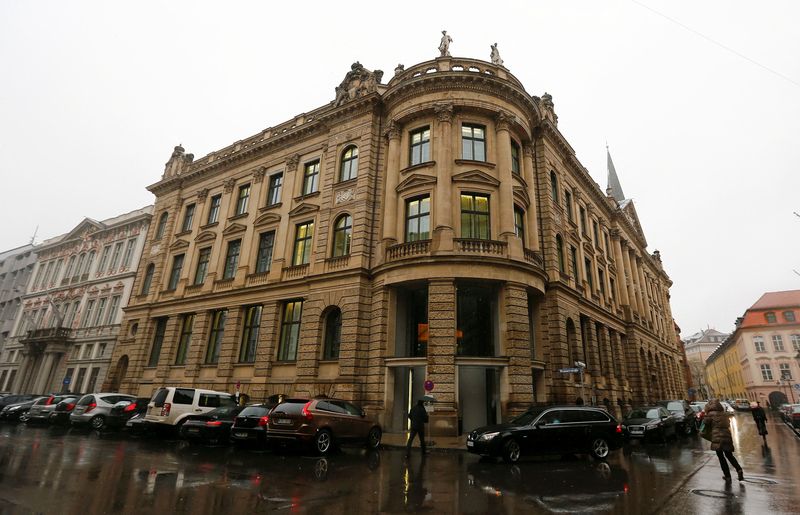European banks cash in on rising rates as clouds gather By Reuters

© Reuters. General view of the headquarters of UniCredit SpA’s German unit HVB (Hypovereinsbank) in Munich November 29, 2012. REUTERS/Michael Dalder/Files
2/5
By Tom Sims, John O’Donnell and Jesús Aguado
FRANKFURT (Reuters) – Some of Europe’s largest banks warned of growing risks as the economy fizzles after posting stronger-than-expected profits on Wednesday, helped by a trading boom in volatile markets and higher interest rates.
The boost from the rising cost of borrowing, kept at rock bottom since the financial crash more than a decade ago, is a relief for banks, although it risks causing other problems, like hitting demand for loans and bursting property price bubbles.
In Germany, Deutsche Bank (ETR:) posted a better-than-expected jump in third-quarter profit as a trading boom at its investment bank offset a nosedive in dealmaking.
And Italy’s UniCredit raised its 2022 profit goal, helped by higher interest rates and lower loan loss provisions that also drove quarterly earnings above forecasts.
Results from Britain’s Barclays (LON:), Spain’s Santander (BME:), and Standard Chartered (OTC:), which earns most of its revenue in Asia, also positively surprised investors.
The rosy results contrast with an increasingly bleak outlook, with war in Ukraine, soaring inflation, energy shortages and expected economic contraction.
Those factors portend more difficulty in the months ahead and most of the lenders put aside more money for loans that could potentially sour.
“We expect the macroeconomic environment to remain challenging as markets across Europe and North America adapt to levels of inflation not experienced in decades,” said Santander’s Chair Ana Botin.
The performance of the five European banks compares favourably with more mixed results from U.S. rivals, where profits declined largely because investment banks were battered by a slump in dealmaking.
European banks, which are traditionally less reliant on deals for revenue than their U.S. competitors, have been cashing in on central bank efforts to arrest runaway inflation.
For years, banks bemoaned ultra loose monetary policy, but now higher interest rates means banks can start to benefit from the increased gap between what they charge borrowers and what they pay savers.
On Thursday, the European Central Bank (ECB) is set to raise the cost of borrowing further, offering an additional lift to banks.
“Some banks have huge increases in interest income,” said Jerome Legras of Axiom Alternative Investments.
“For the short term, it’s good,” he said, while cautioning about risks. “In terms of what will happen for corporate risk and mortgages, nobody really knows.”
Deutsche Bank’s finance chief James von Moltke told journalists that loan growth would “undoubtedly” slow “going into a weaker economic environment”.
Banks turn in fortunes is bitter sweet. It could attract the attention of political leaders, seeking to cover the costs of war and an energy crisis.
The Spanish parliament is debating a proposal that involves a 4.8% charge on banks’ net interest income and net commissions.
A source familiar with the British government’s plans said new finance minister Jeremy Hunt was reviewing the surcharge on bank profits and would confirm the level later this month.
Shares of European banks have lost around 25% from their peaks before Russia’s invasion of Ukraine, as investors fret about how a growing energy crisis, a weakening economy and soaring inflation will hurt their bottom lines.
The war in Ukraine upended business for banks, which scrambled to limit their ties to Russia and impose a series of sanctions packages.
UniCredit, which has failed so far to sever ties with its Russian unit, posted a profit for July-September of 1.71 billion euros ($1.71 billion), well above analysts’ consensus forecast of 1.00 billion euros provided by the bank.
Standard Chartered’s third-quarter profit surged 40% as higher interest rates boosted the emerging markets-focused bank’s income, giving it ammunition to upgrade its revenue outlook despite a weakening global economy.
“The pace of economic recovery in many of our footprint markets is encouraging, notwithstanding increasing recessionary pressures in certain Western markets,” CEO Bill Winters said.
For Santander, higher loan loss provisions in key markets like Brazil and the United States overshadowed better than expected third-quarter earnings.
Deutsche Bank and Barclays both benefited from increases in fixed-income trading, which outperformed some U.S. rivals.
Despite its ninth consecutive quarter of profit after years of losses, Germany’s largest lender warned of an “increasingly challenging” environment and “intensified” cost pressures.
While benefiting from higher interest rates, banks also face the unwinding of a scheme that buoyed their profits for years.
Under that programme, 2.1 trillion euros of ultra-cheap loans were given by the ECB to banks, which in turn parked much of the cash back with the central bank, earning interest.
That subsidy, which analysts estimate was worth tens of billions, may now be unwound with an announcement as soon as Thursday.
Deutsche Bank’s von Moltke called discussion on the loan programme a “disappointment”.
($1 = 0.8661 pounds)
($1 = 0.9975 euros)
For all the latest Business News Click Here
For the latest news and updates, follow us on Google News.
